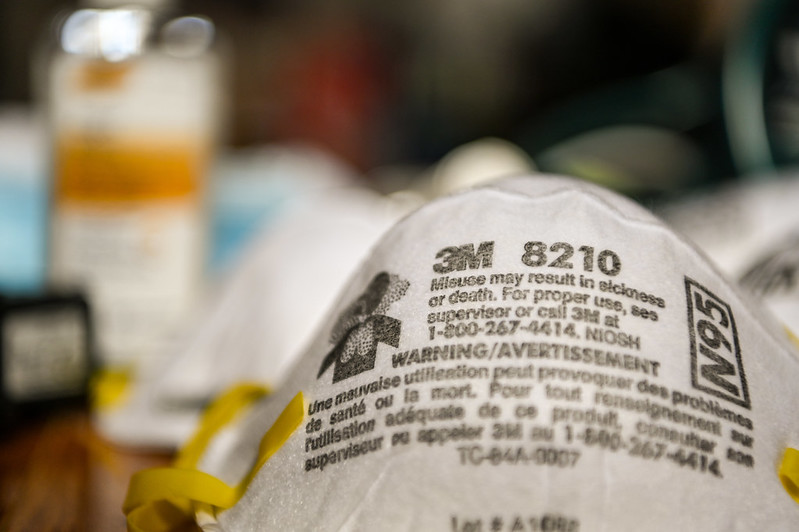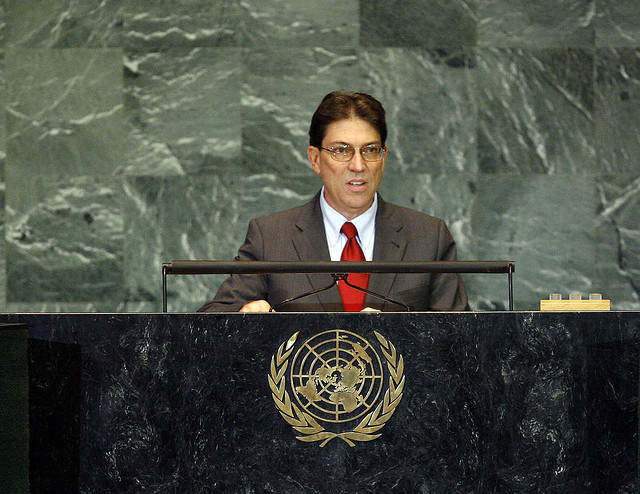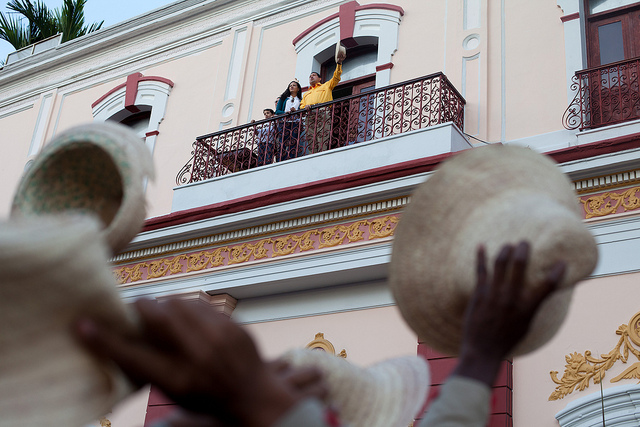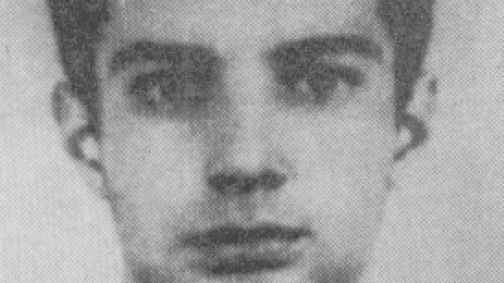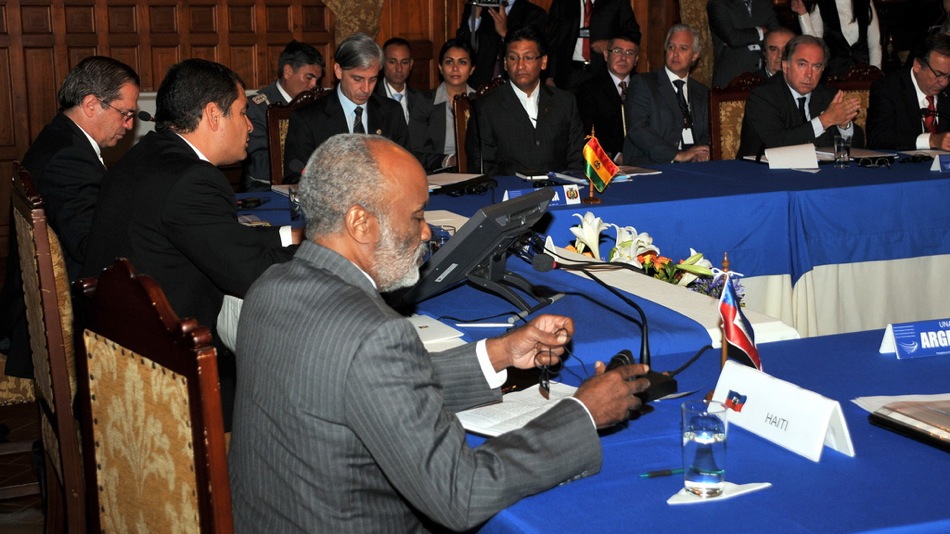
Guatemala, Latin America: Week in Review
Guatemalan Residents Return Home After Tropical Storm Agatha
June 3, 2010 By Staff
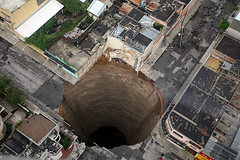
A sinkhole caused by Tropical Storm Agatha in Guatemala City.
Today in Latin America
Top Story — Guatemalan residents began returning home earlier this week after Tropical Storm Agatha ravaged much of Central America and left 183 people dead with thousands more homeless.
Guatemala was the hardest hit by Agatha, with a reported 156 people dead and another 103 people missing in the country alone. 18 foreign nations have offered to aid to Guatemala, including the United States which sent six support helicopters from a base in Honduras to aid with recovery efforts, Brazil which gave 20,000 tons of corn and 5,000 tons of rice, Cuba which offered a team of medics.
The European Union also gave 2.4 million dollars in emergency assistance and the World Bank said it was finalizing an 85-million-dollar loan to help Guatemala.
“We need water, diapers, food and cots, but what we need most is food; there is nothing,” said Elbia Coraro, the sanitation chief for Guatemala’s national disaster agency, according to the New York Times. “The kids need to eat.”
Guatemala was ill-prepared to met the needs of the storm, as President Álvaro Colom’s government has been struggling to handle a hunger crisis brought on by the country’s worst drought in decades. An estimated 125,000 people had to be evacuated in Guatemala alone.
Agatha also left an enormous sinkhole in a Guatemala City neighborhood. The hole is 66 feet across and nearly 100 feet deep.
Geologists are not sure exactly what caused the sinkhole, but an underground cave formation has been theorized due to the holes circular pattern.
Just Published at the Latin America News Dispatch
- A case before the Inter-American Court of Human Rights may challenge Brazil’s amnesty law, which shields people from punishment for political crimes committed during the military dictatorship.
- Silvio Rodíguez visits the United States for the first time in 30 years. The Latin America News Dispatch reports on the press conference he gave in New York City on Tuesday.
- Supporters of the DREAM Act started a hunger strike outside Senator Charles Schumer’s Manhattan office. Alison Bowen reports in the latest installment of Beyond Borders.
- Human rights organization Amnesty International called upon the Peruvian government to drop all charges against indigenous leader Alberto Pizango.
Headlines from the Western Hemisphere
North America
- The Mexican foreign ministry has demanded a full investigation into the death of one of the country’s citizens after he was beaten and shot with electric stun guns by US border patrol agents.
- Former Beatle Paul McCartney’s tour bus was attacked by a group of youths after he finished his second and final night at Mexico City’s Foro Sol arena. McCartney was unharmed and is currently in the United States to receive the Library of Congress Gershwin Prize.
- Goldcorp Inc agreed to sell Mexico’s San Dimas gold-silver mine to Mala Noche Resources Corp for $500 million.
Caribbean
- Cuba’s state-run newspaper, Granma, has begun running letters critical of the country’s economy, this occurs after Raúl Castro called for a debate on the shortcomings of Cuba’s economy.
- 314 American troops from Operation Unified Response left Haiti this week, marking the end of a humanitarian relief effort that in February had 22,000 soldiers, sailors and Marines in the country.
Central America
- Nicaragua suspended diplomatic ties with Israel Tuesday following Israel’s attack on the Gaza-bound aid ship that killed nine people.
- The Foreign Ministry of Panama announced Tuesday that it has officially requested the extradition of former dictator Manuel Noriega from France to face charges of human rights violations.
- The governments of Costa Rica, El Salvador, Guatemala and Honduras are halting or restricting mining operations in their countries due to environmental and health concerns.
- Costa Rica’s Health Minister defended the closure of the country’s largest stem cell clinic Wednesday, saying that the clinic’s harvesting of adult stem cells to treat genetic diseases and injuries “isn’t allowed in any serious country in the world.”
Andes
- Member’s of Colombia’s Conservative party announced in a statement that the party would back presidential front-runner candidate Juan Manuel Santos.
- Nine members of the Colombian guerilla group the National Liberation Army (ELN) were killed in a clash with the country’s security forces.
- The Venezuelan government seized control of three more brokerage firms in a clampdown on currency trading ordered by President Hugo Chávez.
- U.S. President Barack Obama met with Peruvian President Alan Garcia Tuesday evening, where Obama called Peru an “extraordinary economic success story.”
- U.S. Assistant Secretary of State for Western Hemisphere Affairs Arturo Valenzuela met with Bolivian Foreign Minister David Choquehuanca in La Paz to discuss improving ties between the two countries.
Southern Cone
- Six former military officers in Argentina are facing trial for the detention, torture, and murder of 65 people during the country’s 1976-1983 military dictatorship.
- The Chilean paper company CMPC said Wednesday that a workers’ strike for higher pay has halted production at its largest sawmill in the country.
- A study conducted in Brazil, where abortion is illegal except under exceptional circumstances, showed that one in five Brazilian women has terminated a pregnancy and that 200,000 women a year are hospitalized after undergoing an illegal abortion.
- Uruguay will hold a Danish-style consensus conference to help determine whether the country should build nuclear energy plants like neighbors Brazil and Argentina.
- Paraguay beat Greece 2-0 in a World Cup warmup Wednesday.
Image:Gobierno de Guatemala @ Flickr.
